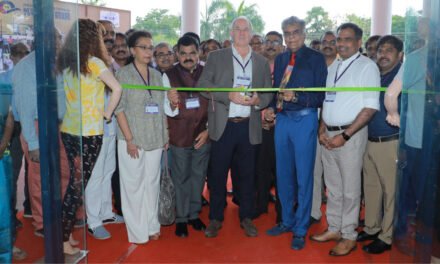
Experts, policymakers, and industry leaders gathered at TANTU Seminar to discuss pressing issues surrounding sustainability and recycling in the textile and apparel industry. The event, held at India International Centre, aimed to explore innovative solutions to minimize waste, promote circular economy practices, product life cycle analysis, and drive sustainable manufacturing.
The event featured presentations by eight distinguished speakers who shared their insights on sustainable practices, technological advancements, and policy initiatives shaping the future of the textile industry. The keynote address was delivered by Dr. Ashok Kumar, Deputy Director General, Bureau of Energy Efficiency, New Delhi, who emphasized the urgent need for industry-wide collaboration. ‘Why the Textile Industry should take actions right now on sustainable practices.” He reminded the delegates about the goals of the Paris Agreement 2015. Under that agreement all countries are to limit global warmings to well below 2oC above pre-industrial level and to reduce Green House Gas (GHG) emissions as soon as possible and reach net zero emissions by the middle of the 21st Century. He advised the delegates to move into action as the time of research and discussion is over by now.
 Gaurav Seth, Head Strategic Partnership, Indo-German Yarn and Fibre LLP, discussed about recycling, re-engineering of performance textiles. With increased use of technical textiles, the usage of performance fibres such as para-aramid, meta-aramid, carbon fibres are increasing day by day. Process waste of these materials and end-of life technical textile products are becoming burden to the earth. They have successfully developed methods to recycle them and supplying the recycled products to various companies, engaged in technical textile manufacturing.
Gaurav Seth, Head Strategic Partnership, Indo-German Yarn and Fibre LLP, discussed about recycling, re-engineering of performance textiles. With increased use of technical textiles, the usage of performance fibres such as para-aramid, meta-aramid, carbon fibres are increasing day by day. Process waste of these materials and end-of life technical textile products are becoming burden to the earth. They have successfully developed methods to recycle them and supplying the recycled products to various companies, engaged in technical textile manufacturing.
Ajitesh Upadhyaya, Senior Section Expert – Textile, BEE, India detailed the Indian Carbon Market Framework, Carbon Credit Trading Scheme (CCTS) In India, PAT Cycle – Textile Target & Savings in MTOE to CCTS, Alignment with International Carbon Tax Regulations.
Chinky Tyagi Khare, Green Story detailed the way for navigating sustainability regulations and Role of product life cycle assessment (LCA) in the textile and apparel industry. She added how Green Story is helping industry in life cycle assessment through the green story tools for LCA. She had emphasized the shrinking regulatory timeline and rising pressure. “Manufacturers risk losing deals and reputational damage if they cannot provide the required environmental footprint information as responsibility shifts up the supply chain” she stated.
Pankaj Kapoor, Independent Director, Green Consulting, shared his views on the climate change and scope and Impact in the textile and apparel industry. He detailed the negative impact areas in the textile and apparel industry. He demonstrated the Key Metrics for Sustainability measures and pointed out the Key ESG regulatory deadline in 2025.
An academia from IIT Delhi, Prof. Abhijit Majumder shared the success of their experiment they are doing on post-consumer textile and apparel recycling and regenerating yarns for the fully fashion apparel items and other uses.
 “The fashion industry has a responsibility to rethink its environmental impact,” said Sutantu Goswami, Senior General Manager, TUV SUD, South Asia. “By adopting responsible sourcing, ethical production, and recycling initiatives, we can move towards a more sustainable future.”
“The fashion industry has a responsibility to rethink its environmental impact,” said Sutantu Goswami, Senior General Manager, TUV SUD, South Asia. “By adopting responsible sourcing, ethical production, and recycling initiatives, we can move towards a more sustainable future.”
“Disclosure is a business necessity now,” said Sanya Arora, Engagement Office, CDP. She talked about the SME criteria and options for disclosure.
Dr. Arindam Basu, DG, and Lalit Goswami, Senior Scientific Officer, NITRA, presented a paper on optimization of process parameters while using recycled cotton as a component in 100% cotton yarn.
Also, they mentioned about the limitation in usage of recycled cotton to the extent of 20% and 30% of the blend while using ring spinning and rotor spinning respectively, to produce acceptable quality of yarns. The event concluded with a commitment from various stakeholders to enhance transparency, improve recycling infrastructures, and support policies that encourage sustainability.





















